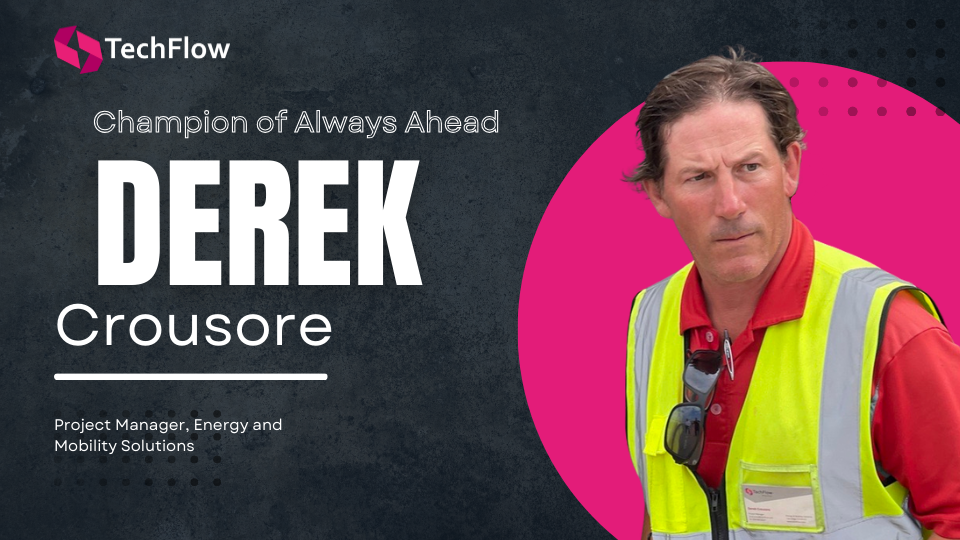As part of our series about “How To Use Digital Transformation To Take Your Company To The Next Level,” I had the pleasure of interviewing Robert Baum.
Robert Baum is the Chairman and CEO of TechFlow Inc., a forward-thinking logistics and digital services solutions company. Founded in 1995 at the start of the dot-com revolution, Robert created TechFlow to help large commercial entities modernize their business systems using what has become known today as Agile-at-Scale software development. Today, TechFlow continues as a leader in applying leading-edge software engineering solutions and technology to the US Government’s most demanding mission and business challenges.
Thank you so much for joining us in this interview series. Before we dive in, our readers would love to “get to know you” a bit better. Can you tell us a bit about your ‘backstory’ and how you got started?

I guess I have always been a bit of an early adopter and technologist with an eye for what was next. Back in High School (early 80s), I became fascinated with Radio Shack TRS-80s for their ability to program using a keyboard instead of punch cards on mainframes which just seemed wasteful. I bought an Apple II+ with my work savings instead of a Jeep Wrangler like my brother. In college, I was naturally drawn to scripted languages over machine coding for the elegance in design and simpler logic. My inner geek has always pushed me towards using technology to make life easier while my pragmatic side has always made sure the choice didn’t introduce unwanted complexity. Leveraging technology to smartly solve difficult problems has always been my passion.
Can you share a story about the funniest mistake you made when you were first starting? Can you tell us what lessons or ‘take aways’ you learned from that?
After graduating from the University of Michigan and moving to San Diego, I got a job with NCR Corporation working on their mainframe communications platform. I remember getting my first assignment from my manager to build an interactive testing application across an IBM standard communications protocol with a tight due date in two weeks. I worked really hard but could not get everything my boss wanted accomplished despite working long days and nights. Without an explanation, I sent him a link to my mess that didn’t compile, didn’t work, and was wholly incomplete. I had treated this first assignment like a college course. He laughed at me and said “Dude… in the business world, giving me something that does not work does not work.” Pretty obvious lesson but important for helping me understand the importance of communications in business.
None of us are able to achieve success without some help along the way. Is there a particular person who you are grateful towards who helped get you to where you are? Can you share a story?
I come from a family of entrepreneurs on both sides of my parents. As I studied for my MBA, one of my course assignments was to interview a successful entrepreneur — I chose my Uncle Ed. He was a very successful business man that had created and driven the success of a men’s clothing label. When I asked him what made him so successful, his answer inspired me and has lived within me ever since. He said “I know I am not the smartest guy (there is always someone smarter), but I do know and control my dedication and drive. I’ll work harder and longer and beat the other guys by putting in more time, energy and focus. Do the work and you can be the best.” I’m a lot smarter than he was (lol), but his drive to deliver excellence thru hard work and dedication has stayed with me forever. My uncle died of lung cancer too early in his life, but his work ethic lives on thru several of my relatives and family.
Is there a particular book, podcast, or film that made a significant impact on you? Can you share a story or explain why it resonated with you so much?
I buy a lot of business books and completely read just a few. For me, I like to grab one or two key sections of a book and use that to influence or change a perspective I’ve experienced. No one book, podcast or film stands out. In terms of films, I am a Marvel movie guy and enjoy watching my favorite superheroes save the world! Lol.
Extensive research suggests that “purpose driven businesses” are more successful in many areas. When your company started, what was its vision, what was its purpose?
TechFlow was very focused on empowering our customer’s employees by exposing distributed data in a logical workflow to make smart decisions. Twenty-five years ago, there wasn’t a lot of connectivity between a company’s financial, HR, and business process systems. We tied these systems together by grabbing the right data, at the right time, to help an employee make the right decision in a connected workflow. It was a lot of fun because we made people more efficient by being more in the know.
Are you working on any new, exciting projects now? How do you think that might help people?
We are — there are so many! I love the work we are doing for TSA ensuring their scanners are up to date and functioning at their best which makes flying safer and less stressful for our nation. I love our work with DHS on modernization and cloud migration that is moving many of their legacy applications off of expensive mainframes and onto the cloud where it can be distributed and optimized efficiently. I love some of our energy projects and the big companies we are partnering with to provide truly forward-leaning energy solutions. And finally, I love some of the cool ways we are bringing efficiencies and digital technologies to some of the military’s base operations so they can continue to focus on their mission while we optimize the maintenance.
Thank you for all that. Let’s now turn to the main focus of our discussion about Digital Transformation. For the benefit of our readers, can you help explain what exactly Digital Transformation means? On a practical level what does it look like to engage in a Digital Transformation?
Digital Transformation is the use of technology to digitize and distribute data for faster, better decision-making. Data is everywhere, but its use today is restricted to how and when it is collected, where it is stored, and how it is accessed to drive decisions. When a company decides to go on a digital transformation journey, the first steps usually open the doors to the art of the possible, and the constraints of the practical! TechFlow guides companies down this journey by looking at first what is available today — what data exists today and what is missing. Transformation is a journey, not a destination.
Which companies can most benefit from a Digital Transformation?
All companies can benefit from digital transformation. Any company still using paper forms to drive decisions will experience a leapfrog in capability by undergoing a digital transformation today because of the evolution, simplicity and sophistication of the tools available across industries. Information is power. Companies that adopt and leverage a digital transformation to optimize their business today will drive their industry in the years that come.
We’d love to hear about your experiences helping others with Digital Transformation. In your experience, how has Digital Transformation helped improve operations, processes and customer experiences? We’d love to hear some stories if possible.
From our experience, successful digital transformations bring a company closer to its customers and partners, in addition to helping companies make smarter decisions. TechFlow works with many Federal Government agencies, but our experience with TSA has been one of the more exciting examples. Through COVID, despite a significant drop in air travel, TSA has pushed to transform and modernize in anticipation of a resurgence. They have had a strong appetite for data and analysis to drive decisions and proactively improve services. Under their guidance, we’ve been able to move proactive system maintenance towards a predictive model which has had a significant effect on lengthening the meantime between critical failures of scanning equipment making air travel a more timely and safer experience. The Holy Grail of this effort centered on improving data collected during servicing and maintenance. With more data across environments structured in a more data centric and usable format, better and more informed decision-making has helped the agency strengthen its partnerships and drive its mission.
Has integrating Digital Transformation been a challenging process for some companies? What are the challenges? How do you help resolve them?
All businesses, especially established companies, struggle with change. Success with a digital transformation requires strong change management from top to bottom. In addition, solutions require experienced software architects who empathize with business needs while driving innovations with technology. Taking something that exists and converting into a digital process is not transformative — it is a step, but not a transformation. To transform, a business needs to think and act differently — step outside the lines and apply technology to digitize an increasing amount of data. The road to transformation is not definitive and it is not a defined ending destination — the road to transformation is iterative and on-going. Move fast, make small incremental changes, get buy-in and repeat!
Ok. Thank you. Here is the primary question of our discussion. Based on your experience and success, what are “Five Ways a Company Can Use Digital Transformation To Take It To The Next Level”? Please share a story or an example for each.
- Improve Decision-making. Digital implies the digitization of more data. With more data to analyze and use, businesses will make smarter decisions. At GSA, understanding more about their customers allowed the agency to improve satisfaction with their services and offer more!
- Jump Outside the Box! Analysis of digital data can reveal surprising relationships among data elements that become actionable and pave the way to efficiencies. For one of our customers, just being able to highlight the differences in OEM issue resolutions has led to more helpful proactive fact-based conversations that improved service times.
- Unplug that Cable Box! For the CDC, being able to operate out of the cloud in hurricane impacted zones freed the burden of locally preserving/protecting data. With its applications in the cloud, local hurricane impacted storage became a problem of the past. By intelligently migrating applications and data storage to world class cloud operators, many of the traditional maintenance and operational concerns of the past drop away like your cable box.
- Ask Siri! Artificial intelligence is here to stay. While the access, tools and specialized knowledge required are still somewhat barriers to implementation, investigating the use of AI to fuel better decisions is extremely transformative. While we are unable to discuss some of the coolest uses of AI we were part of, agencies across the spectrum are using it to make faster and more accurate decisions.
- Do more for the people! While our focus for digital transformation is on the customer, we have derived value by enhancing the tools, training, internal processes, and technology available to our people. Transformation implies change — most people resist change. So by enhancing education, arming people with cool useful technology, and making smart process improvements for the people making the changes, we have seen our project outcomes trend higher.
In your opinion, how can companies best create a “culture of innovation” in order to create new competitive advantages?
An Innovative Culture needs to be driven from the top. It helps to love technology, efficient processes, and new ideas, but a true culture of innovation needs to be a passion driven by someone of influence within the organization. Make it safe by accepting (but not promoting) failure. Keep it positive and encouraging by rolling up the sleeves and getting involved. Push it to be open and encouraging. A culture of innovation is entrepreneurial and exciting.
Can you please give us your favorite “Life Lesson Quote”? Can you share how that was relevant to you in your life?
I don’t know if I have a specific quote as much as a general philosophy about life and leadership. I have always felt like the primary role of the leader was to inspire people to be their best. I try to live my life by seeing the positive and sharing my passion for life with those around me.
How can our readers further follow your work?
I post a lot to our website at www.techflow.com. I opine occasionally on topics at LinkedIn.com.
Thank you so much for sharing these important insights. We wish you continued success and good health!
Authority Magazine
Leadership Lessons from Authorities in Business, Film…https://medium.com/authority-magazine/robert-baum-of-techflow-on-how-to-use-digital-transformation-to-take-your-company-to-the-next-level-4c7c68633511



